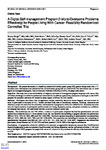A digital self-management program (help to overcome problems effectively) for people living with cancer: Feasibility randomized controlled trial
| dc.contributor.author | Wright, H | |
| dc.contributor.author | Martin, F | |
| dc.contributor.author | Clyne, Wendy | |
| dc.contributor.author | Clark, CCT | |
| dc.contributor.author | Matouskova, G | |
| dc.contributor.author | McGillion, M | |
| dc.contributor.author | Turner, A | |
| dc.date.accessioned | 2023-01-16T10:50:42Z | |
| dc.date.available | 2023-01-16T10:50:42Z | |
| dc.date.issued | 2021-11-01 | |
| dc.identifier.issn | 1438-8871 | |
| dc.identifier.uri | http://hdl.handle.net/10026.1/20171 | |
| dc.description.abstract |
Background: We present the results of a feasibility, randomized waitlist control group (CG) parallel design study with a 1:1 allocation ratio. Participants were randomized into an intervention group (IG) or a waitlist CG. The intervention was a 6-week digital self-management program, Help to Overcome Problems Effectively (HOPE), for people with cancer. Objective: This study aims to test the feasibility of a digitally delivered self-management program for people with cancer. This will inform the design of a definitive randomized controlled trial. In addition, a preliminary assessment of the impact of the HOPE program via secondary outcomes will be used to assess signals of efficacy in a trial context. Methods: Participants were drawn from an opportunity sample, referred by Macmillan Cancer Support, and were invited via email to participate in the study (N=61). Primary outcomes were rates of recruitment, retention, follow-up, completion and adherence, sample size and effect size estimation, and assessment of progression criteria for a definitive trial. Secondary outcomes were self-report measures of participants' positive mental well-being, depression, anxiety, and patient activation (ie, confidence in managing their cancer). The intervention and data collection took place on the web. Results: The recruitment rate was 77% (47/61). A total of 41 participants completed the baseline questionnaires and were randomized to either the IG (n=21) or the waitlist CG (n=20). The retention rate (attending all program sessions) was greater than 50% (all: 21/41, 51%, IG: 10/21, 48%; and CG: 11/20, 55%). The follow-up rate (completing all questionnaires) was greater than 80% (all: 33/41, 80%; IG: 16/21, 76%; and CG: 17/20, 85%). The completion rate (attending ≥3 sessions and completing all questionnaires) was greater than 60% (all: 25/41, 61%; IG: 13/21, 62%; and CG: 12/20, 60%). Engagement data showed that participants viewed between half (5.1/10, 51%) and three-quarters (12.2/16, 76%) of the pages in each session. Conclusions: All progression criteria for a definitive trial were met, as supported by the primary outcome data. The IG showed improved postprogram scores on measures of positive mental well-being, depression, anxiety, and patient activation. A full-scale trial of the digital HOPE program for people with cancer will allow us to fully evaluate the efficacy of the intervention relative to a CG. | |
| dc.language.iso | en | |
| dc.title | A digital self-management program (help to overcome problems effectively) for people living with cancer: Feasibility randomized controlled trial | |
| dc.type | journal-article | |
| dc.type | Journal Article | |
| plymouth.issue | 11 | |
| plymouth.volume | 23 | |
| plymouth.publication-status | Published | |
| plymouth.journal | Journal of Medical Internet Research | |
| dc.identifier.doi | 10.2196/e28322 | |
| plymouth.organisational-group | /Plymouth | |
| plymouth.organisational-group | /Plymouth/Faculty of Health | |
| plymouth.organisational-group | /Plymouth/Faculty of Health/Peninsula Medical School | |
| plymouth.organisational-group | /Plymouth/REF 2021 Researchers by UoA | |
| plymouth.organisational-group | /Plymouth/REF 2021 Researchers by UoA/UoA03 Allied Health Professions, Dentistry, Nursing and Pharmacy | |
| plymouth.organisational-group | /Plymouth/Users by role | |
| plymouth.organisational-group | /Plymouth/Users by role/Academics | |
| dcterms.dateAccepted | 2021-08-02 | |
| dc.rights.embargodate | 2023-1-17 | |
| dc.identifier.eissn | 1438-8871 | |
| dc.rights.embargoperiod | Not known | |
| rioxxterms.versionofrecord | 10.2196/e28322 | |
| rioxxterms.licenseref.uri | http://www.rioxx.net/licenses/all-rights-reserved | |
| rioxxterms.type | Journal Article/Review |


